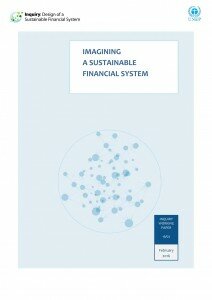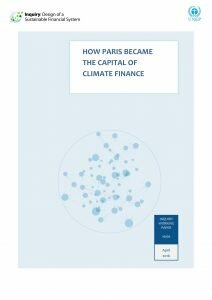Author: Nick Robins
Inquiry Publications
-

UK Country Report
Date: 14-Jan-2016This paper looks at the steps that the UK has taken towards a sustainable financial system shaped by its role as a global financial centre and a distinctive dynamic between social entrepreneurs and civil society organisations, market innovation and policy frameworks.The City of London is not only home to some of the world’s largest financial markets, but
-

European Union Report
Date: 22-Mar-2016This report presents a stock-take of actions under way at the European Union level and in selected Member States to align the rules governing the financial system with environmental sustainability. Looking across the range of innovations across the EU, five broad policy priorities emerge. The central challenge of financing sustainable development in the EU is
-

Financial Reform, Institutional Investors and Sustainable Development
Date: 14-Sep-2015To date interventions to promote the environmental and social dimension of investment have focused principally on disclosure of policies and formal statements of legal duties. They have largely taken fundamental features of the design and operation of the financial system as given. This paper makes the case for a more systemic and dynamic approach. It argues
-

Imagining a Sustainable Financial System
Date: 07-Dec-2014Imagining a sustainable financial system allows us to move beyond conventional wisdoms. This paper sets out that a sustainable financial system would be one that serves the long term needs of a healthy real economy, an economy that provides decent, productive and rewarding livelihoods for all, and ensures that the natural environment on which we all
-

How Paris Became the Capital of Climate Finance
Date: 18-Apr-2016This working paper traces the evolution of the ‘networked solution’ to finance that came together at the COP21 in Paris, linking the formal negotiations with a broader set of actions by financial regulators, by financial institutions and also by civil society. It explores the creative dynamic between France’s efforts to stimulate action within its own
-

Equity markets, benchmark indices, and the transition to a low-carbon economy
Date: 15-Jun-2015Equity markets have a significant share in financial markets, with institutional investors and market-capitalization weighted indices playing a substantial role. Today’s landscape of market-capitalization weighted indices favours high-carbon sectors and creates biases against green, low-carbon technologies. As a result, institutional investors have lower exposure to the green economy, which, in the context of the transition
-

Greening the Banking System
Date: 05-Sep-2016This paper takes stock of G20 experience with green banking, focusing on market practice. It assesses the evolving green banking agenda, focusing on mainstreaming and mobilization, drivers of progress, and key barriers. It concludes with a set of options for consideration by the G20. This input paper has been prepared by the authors as a
-

Insurance 2030
Date: 01-Jun-2015Sustainable development risks and opportunities including natural disasters, access to insurance, climate change and the low-carbon transition, aging populations and long-term investment are high on the agenda for insurance. This working paper has been developed through a consultation involving more than 30 respondents from insurance companies, regulators and stakeholders in over 20 countries, bolstered by engagements held in
-

Greening China’s Financial Markets: The Risks and Opportunities of Stranded Assets
Date: 15-Sep-2014“Stranded assets” are assets that have suffered from unanticipated or premature write-downs, devaluations, or conversion to liabilities. Over the course of the last two decades, the challenges surrounding technological innovation, investor behaviour, and business resilience have become magnified in the context of environmental change. In particular, the issue of stranded assets has emerged as a
-

The Case for Investor Engagement in Public Policy
Date: 06-Mar-2015This report aims: To show why public policy engagement is essential for long-term investors. To give examples of how investors have engaged in public policy and the lessons learned. To offer practical recommendations for long-term investors, policymakers and the PRI to better integrate environmental, social and governance factors in the public policymaking process.